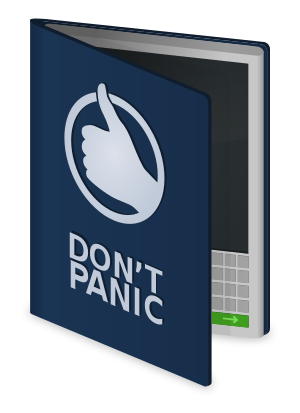The Hitchhiker’s Guide to the Galaxy
Audiobook read by Stephen Fry (IMDb)
Crown, 2004, hardcover (ISBN 1400052920 / 9781400052929)
The Restaurant at the End of the Universe
Audiobook read by Martin Freeman (IMDb)
Del Rey, 1997, paperback (ISBN 0345418921 / 9780345418920)
Life, the Universe and Everything
Audiobook read by Martin Freeman
Del Rey, 2005, paperback (ISBN 0345418905 / 9780345418906)
Source (all): Purchased audiobooks
Reason for reading: Re-read on audio over the course of a couple of months during drives to and from school with my 13-year-old stepson, Spencer
“’This must be Thursday,’ said Arthur to himself, sinking low over his beer. ‘I never could get the hang of Thursdays.’”
Rather than start this Book Talk post with the customary “Opening Lines” excerpt, I will refer you to this Quotes from The Hitchhiker’s Guide list on Goodreads for this and many other gems from the one-of-a-kind mind of Douglas Adams. It takes a one-of-a-kind mind to produce a five-part trilogy, and descriptions of each installment of the series are fairly meaningless–but just in case you happen to be completely unfamiliar with this remarkable piece of work, here’s what The Official Guide to The Hitchhiker’s Guide says about the first three parts:
The Hitchhiker’s Guide to the Galaxy
One Thursday lunchtime the Earth is unexpectedly demolished to make way for a new hyperspace bypass. For Arthur Dent, who has only just had his house demolished that morning, this seems already to be more than he can cope with. Sadly, however, the weekend has only just begun, and the galaxy is a very strange and startling place.
The Restaurant at the End of the Universe
Facing annihilation at the hands of the warlike Vogons is a curious time to have a cosmically displaced Arthur Dent and his curious comrades in arms as they hurtle through space powered by pure improbability – and desperately in search of a place to eat.
Life, The Universe and Everything
The unhappy inhabitants of the planet Krikkit are sick of looking at the night sky above their heads – so they plan to destroy it. The universe, that is. Now only five individuals stand between the killer robots of Krikkit and their goals of annihilation…
I first read these books during my freshman year of university, and I’ve re-read the first two several times since; I was less entranced with the third book and never felt drawn to pick it up again. One of the things that piqued my interest in the man who became my second husband was that his online-dating profile said that the last book he’d (re-)read was The Hitchhiker’s Guide to the Galaxy–”all four books of the trilogy.” (As I mentioned earlier, there are actually five books; my impression is that readership and affection for them follows a downward trajectory after the first two.) We both introduced our kids to the series when they were in middle school; my stepson read it last year, and we decided that we might both enjoy an audio re-read during our drives back and forth from school.
And we enjoyed it very much. Given that The Hitchhiker’s Guide originated as a BBC Radio production, these books seem naturals for the audiobook format, and they’re read by people who know the material well. British national treasure Stephen Fry reads and voices the characters for the original Hitchhiker’s Guide, while Martin Freeman–a/k/a Bilbo Baggins, but also a/k/a Arthur Dent himself in the not-entirely-satisfying 2005 movie adaptation of The Hitchhiker’s Guide to the Galaxy (my husband’s and my first-ever movie date)–takes over the mic for the second and third books. This change leads to some surprising re-characterizations–the most striking of which is Zaphod Beeblebrox’s shift from intergalactic rogue to Jersey Shore mobster-in-training (well, still an intergalactic rogue, but sounding like he’s from an entirely different part of the galaxy. Maybe it’s the second head talking…)–but we acclimated to them pretty quickly.
I thought that the comedy of the Hitchhiker’s Guide series came across even better in audio form than it does on the page, largely because it’s enhanced by the delivery of Fry and Freeman, respectively. I also appreciated the story itself differently this time around because of certain pop-cultural experiences I’ve had during the decade or so since my last re-read, particularly my absorption by the world of Doctor Who. I detected many Whovian references and resemblances on this listen that I just didn’t know to notice before, and it makes perfect sense that I did; Douglas Adams and the Doctor had a long-term relationship, which is borne out by this bit of trivia:
“The third novel of Hitchhiker‘s Guide…, Life, The Universe and Everything, was originally intended to be a Doctor Who story. The Doctor was replaced with Slartibartfast, a planet designer from Magrathea, his TARDIS by the Starship Bistromath (which boasted a perception filter) and the Daleks by the Krikkiters.”
Perhaps that’s why I liked Life, The Universe and Everything much more this time than I did when I originally read it, although The Restaurant at the End of the Universe remains my favorite of the entire series. The first two books fit together so well–although it now makes more sense to me why the third one feels not entirely of a piece with them–but Restaurant is just a little better realized overall.
It occurs to me that the “Hitchhiker’s Guide” itself, described as “(having) many omissions and contain(ing) much that is apocryphal, or at least wildly inaccurate,” may well be the genesis of Wikipedia. It also occurs to me that Douglas Adams was a huge contributor to the development of a particularly nerdy and humorous worldview, and I’m not sure I understood before this just how much he’s shaped the way I engage with life, the universe, and everything. I’m so glad I revisited these books in audio form, and I’m pretty sure this won’t be the last time.









